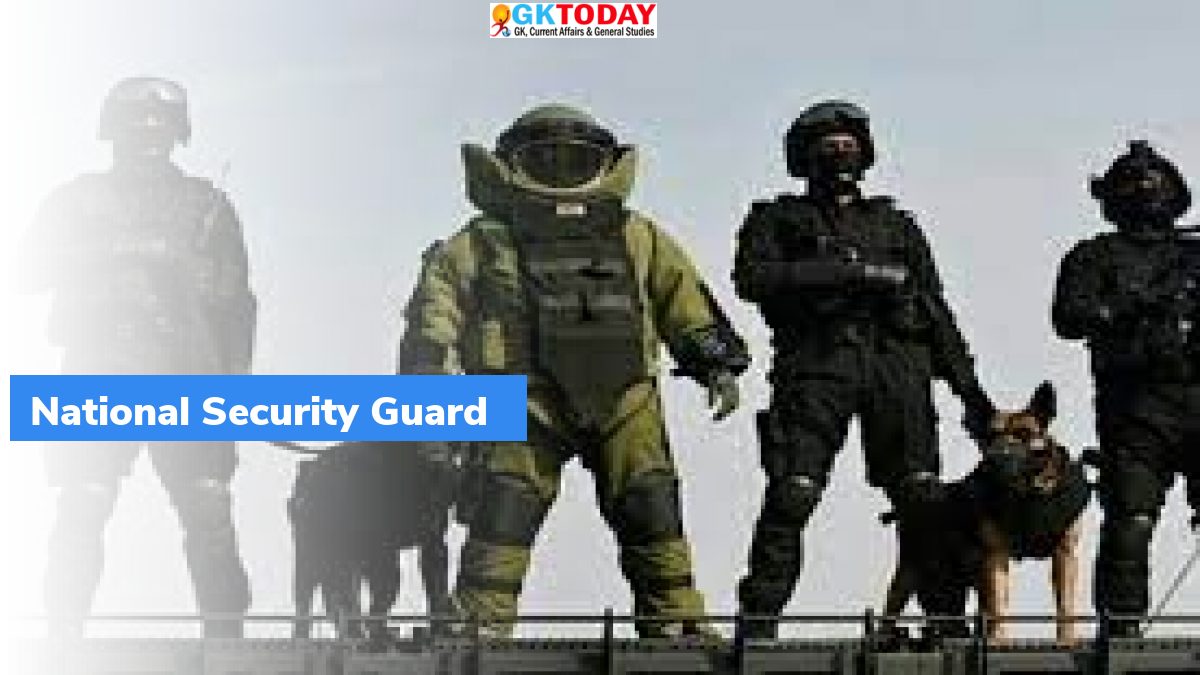National Security Guard
The National Security Guard (NSG), often referred to as the Black Cats, is an elite counter-terrorism unit of India. It operates under the Ministry of Home Affairs. Established on 16 October 1984, the NSG was created in response to the violent events of Operation Blue Star. Its primary mission is to combat terrorism and manage internal disturbances.
Formation and Legal Framework
The NSG was formally constituted by the National Security Guard Act of 1986. This act established the unit’s mandate and operational framework. The NSG is not classified as a traditional paramilitary force. Instead, it functions as a specialised federal contingency unit, designed for rapid response to extreme security threats.
Recruitment and Structure
Personnel in the NSG are recruited from the Indian Army and Central Armed Police Forces (CAPFs). The unit comprises volunteers, and commandos serve on deputation. The NSG maintains a strict selection process, with a dropout rate of 70-80%.
Operational Mandate
The NSG is a contingency deployment force. It intervenes during severe terrorist attacks and crisis situations. The unit is intended for exceptional circumstances and does not replace state police or para-military forces. Its role has evolved over time, including temporary duties for VIP security, which were reverted in 2020.
Historical Context
The NSG was inspired by successful models like the British Special Air Service (SAS) and Germany’s GSG 9. Its establishment was a direct response to the high collateral damage during Operation Blue Star, which brought into light the need for a dedicated counter-terrorism force.
Headquarters and Administration
The NSG’s administrative headquarters is located in Mehram Nagar, Palam. The unit is led by a Director-General, supported by Indian Police Service officers. The operational headquarters is situated in Manesar, where tactical operations and training are conducted.
Special Action Groups (SAG)
The NSG has two Special Action Groups –
- 51 Special Action Group – Focuses on counter-terrorism and counter-insurgency.
- 52 Special Action Group – Primarily responsible for anti-hijacking operations.
Each group is composed of small operational units called “hits”, which consist of five members.
Special Ranger Groups (SRG)
The NSG includes three Special Ranger Groups (SRGs) – 11, 12, and 13. Initially, the SRGs served logistical roles and performed lower-risk operations. Over time, their functions evolved, with the 11 SRG integrated into counter-terrorism efforts. The other two groups remained involved in VIP security until recent policy changes.
Special Composite Groups (SCG)
The NSG operates Special Composite Groups at regional hubs across India. Each SCG is a mixed unit of personnel from the Indian Army and CAPFs. They respond to incidents in their respective regions and are led by a Colonel on deputation from the Army.
National Bomb Data Centre (NBDC)
Established in 1988, the NBDC plays important role in monitoring bombing incidents. It analyses data to enhance expertise in explosive threats. The NBDC also conducts research and development in explosives engineering, acting as a nodal agency for bomb-related incidents.
Regional Hubs and Infrastructure
The NSG has established several regional hubs to improve response times. These hubs are located in:
- New Delhi
- Mumbai
- Hyderabad
- Kolkata
- Gandhinagar
Each hub is equipped with training facilities, living quarters, and logistical support. Future hubs are proposed in Amritsar and other strategic locations.
Training and Selection
NSG training is rigorous and spans 14 months. The selection process includes physical and psychological assessments. Candidates undergo basic training at the National Security Guard Academy in Manesar, followed by advanced training in various combat techniques.
Joint Exercises and International Collaboration
The NSG frequently conducts joint exercises with international forces, notably the U.S. Army and Germany’s GSG 9. These collaborations enhance tactical skills and operational readiness. Exercises like TARKASH focus on counter-terrorism strategies and urban warfare.
Recent Developments and Future Plans
In response to past criticisms, the NSG has expanded its regional presence. The establishment of new hubs aims to boost counter-terrorism capabilities across India. Training facilities are continually upgraded to keep pace with evolving threats.
Women in NSG
Women have been part of the NSG since 2012. Their inclusion marks step towards gender equality in elite security forces. The NSG actively promotes female participation in its ranks.


